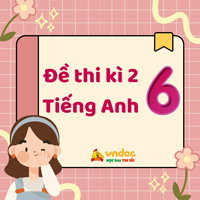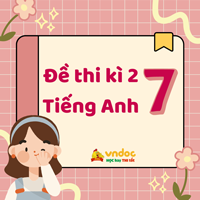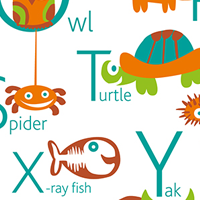Bài tập cuối tuần Tiếng Anh 8 tập 1 tuần 14 Practice and Test
Bài tập ôn tập kiểm tra 1 tiết tiếng Anh lớp 8 lần 2 có đáp án có cấu trúc giống với đề thi chính thức của bộ GD&ĐT với nhiều dạng bài tập trắc nghiệm tiếng Anh 8 khác nhau như: Chọn từ có trọng âm khác, Viết lại câu sao cho nghĩa không thay đổi, Chọn đáp án đúng, Điền từ thích hợp vào chỗ trống hoàn thành đoạn văn,... giúp các em học sinh lớp 8 rèn luyện kỹ năng làm bài thi hiệu quả.
English 8 Week 14: Practice And Test
Nằm trong bộ bài tập cuối tuần môn tiếng Anh lớp 8 năm 2019 - 2020, đề ôn tập cuối tuần 14 môn Anh 8 có đáp án do VnDoc.com sưu tầm và đăng tải. Đề ôn tập tiếng Anh 8 được biên tập bám sát nội dung bài học Unit 4 - 6 tiếng Anh 8 hệ 7 năm giúp các em học sinh ôn tập kiến thức trọng tâm, chuẩn bị tốt cho kì kiểm tra 1 tiết lần 2 tiếng Anh 8 sắp tới.
I. Em hãy chọn từ có cách đánh trọng âm khác các từ còn lại trong mỗi dòng sau. (1đ)
1.A. because
B. modern
C. story
D. farmer
2. A. invent
B. practice
C. collect
D. begin
3. A. remember
B. encourage
C. important
D. pioneer
4. A. different
B. behavior
C. revision
D. computer
5. A. tiger
B. grammar
C. improve
D. study
II. Em hãy cho dạng đúng của động từ trong ngoặc để hoàn thành đoạn văn sau. (1đ)
Albert Maltz was a Progressive American writer. He was born in 1908. In 1934 Maltz (1. write)________ his first play “Peace on Earth”. It was against wars. Albert Maltz wrote stories, too. Some of them are about the life of American workers, some (2. tell) _________ about the workers’ children.
“Circus come to town” (3. be) _________ one of these stories. In 1950 the American police (4. arrest)__________ Maltz and put him in prison. In 1951 Maltz (5. go)_______ to Mexico, where he lived until his death.
III. Em hãy chọn một đáp án đúng để hoàn thành câu, (2đ)
1. He found learning to drive easy and_________his driving test the first time.
A. sat
B. succeeded
C. passed
D. made
2. ____________the wet weather, the football match went ahead.
A. Although
B. Owing to
C. However
D. In spite of
3. How can I know_______ book is yours? They are so alike.
A. what
B. which
C. this
D. the
4. Instead of buying a new pair of shoes, I had my old ones________ .
A. to repair
B. repaired
C. repairing
D. repair
5. You have never been to Australia,_______ ?
A. have you
B. haven’t you
C. you have
D. you haven’t
6. The smaller the room is, the________ furniture it needs.
A. fewer
B. little
C. more
D. less
7. When______ a language, you should not translate every word into your mother tongue.
A. learn
B. to learn
C. learning
D. learned
8. The news on TV last night_______ very interesting.
A. were
B. was
C. has
D. be
9. – It is not easy to learn English well.
-__________________
A. No, it is not.
B. Of course. No.
C. Yes, of course.
D. Yes, I agree.
10. – Are the children still at school?
-__________________
A. No, they have gone home.
B. Yes, they have been home.
C. No, why not?
D. Yes, I’d like them to be there.
IV. Em hãy điền một từ thích hợp vào mỗi chỗ trống để hoàn thành đoạn văn sau, (1đ)
DO SMALLER CLASSES REALLY HELP?
In an experiment in Canada, ten-year-old children (1)__________ put in classes of four sizes: 16, 23, 30 and 37 children in each class. Their teachers (2)____________that the smaller classes would result in more individual attention and better marks. (3)_________ , when the children were tested, those in the smaller classes didn’t get higher marks (4) ______________ the others, except in mathematics. Moreover, children in the (5)__________ classes said they liked school just as much.
V. Em hãy chọn một đáp án đúng trong ngoặc để hoàn thành câu. (1đ)
1.He went to the barber’s to (get, make,do) his hair cut.
2. Move your car, please. (Stopping, Parking, Standing) is not allowed here.
3. A young pioneer club has been (set up,found, put up) at our school.
4. He was looking out of the window and didn’t see me (entering, coming, stepping) into the room.
5. Those chalk marks will easily (go, come, send) off your jackets if you brush it.
VI. Em hãy đọc đoạn văn sau rồi trả lời những câu hỏi bên dưới (2đ)
UMBRELLAS
The umbrella is a very ordinary object. It keeps the rain and the sun off people. Most umbrellas fold up, so it is easy to carry them.
However, the umbrella did not begin life as an ordinary object. It was a sign of royalty or importance. Some American tribes still use umbrellas in this way today. Someone carries an umbrella and walks behind the king or important person.
Umbrellas are very old. The Chinese had them in the eleventh century B.c. From there, they traveled to India, Persia, and Egypt. In Greek and Rome, men would not use them. They believed umbrellas were only for women.
When the Spanish explorers went to Mexico, they saw the Aztec kings using umbrellas. English explorers saw Native American princes carrying umbrellas on the east coast of North America. It seems that people in different parts of the world invented umbrellas at different times.
England was probably the first country in Europe where ordinary people used umbrellas against the rain. England has a rainy climate, and umbrellas are very useful there.
1.People began to use umbrellas because it was_______ .
A. for the rain
B. for the sun
C. a sign of a great person
D. an ordinary object
2. Somewhere in the world now a great person still walks__________ someone with an umbrella.
A. before
B. beside
C. next to
D. behind
3. Where would men not use umbrella as they thought only women used them?
A. In China
B. In Africa
C. In India
D. In Italy
4. English people start using umbrellas because they has___________.
A. royalty
B. a rainy climate
C. too much sun
D. great men and women
5. Which of the following is not true about umbrellas?
A. They are very useful in rainy and sunny weather.
B. They were invented in different parts of the world.
C. The Chinese had them in the eleventh century
D. The Spanish explorers first invented them in Mexico.
VII. Em hãy dùng từ gợi ý viết hoàn chỉnh đoạn văn về Thomas Edison (2đ)
1.when a boy / school / Edison / a lot / questions/ so / teacher / send / home /.
_________________________________________________________
2. mother / teach him / home / begin / experiments /.
_________________________________________________________
3. earn / money / for / experiments / by / garden /.
_________________________________________________________
4. later / work / on / train / continue / experiments there /.
_________________________________________________________
5. unfortunately / one / experiments / set / fire / the train /.
_________________________________________________________
ĐÁP ÁN
I. (0,2 x 5 = 1đ)
1.A
2. B
3. D
4. A
5. C
II. (0,2 X 5 = lđ)
1.wrote
2. tell
3. is
4. arrested
5. went
III. (0,2 x 10 = 2đ)
1.C
2. D
3.B
4. B
5. A
6. D
7. C
8. B
9. A
10. A
IV. (0,2×5 = lđ)
1.were
2. said/ expected
3. However
4. than
5. larger
V. (0,2 X 5 = lđ)
1.get
2. Parking
3. Setup
4. coming
5. come
VI. (0,4×5 = 2đ)
1.C
2. A
3. D
4. B
5. D
VII. (0,4 X 5 = 2đ)
1.When (he was) a boy at school, Edison asked a lot of questions so the teacher sent him home.
2. His mother taught him at home and he began to do / carry out experiments.
3. He earned money for his experiments by gardening/ by doing the gardening.
4. Later he worked on the train and continued to do experiments there.
5. Unfortunately in one of his experiments he set fire to the train.
Trên đây là Đề ôn tập kiểm tra 1 tiết lớp 8 lần 2 môn tiếng Anh kèm đáp án. Mời bạn đọc tham khảo thêm nhiều tài liệu ôn tập Tiếng Anh lớp 8 cả năm khác như: Để học tốt Tiếng Anh lớp 8, Đề thi học kì 1 lớp 8, Đề thi học kì 2 lớp 8, Bài tập Tiếng Anh lớp 8 theo từng Unit trực tuyến,... được cập nhật liên tục trên VnDoc.com.










